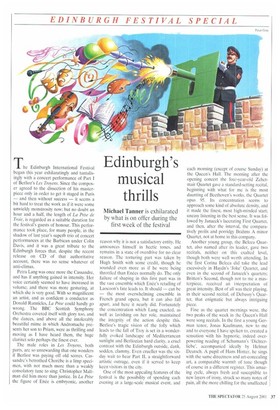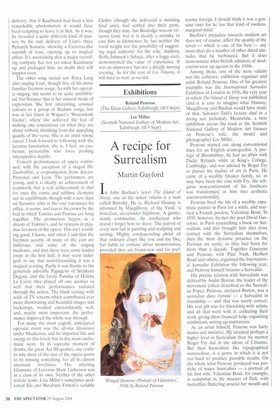Edinburgh's musical thrills
Michael Tanner is exhilarated by what is on offer during the first week of the festival The Edinburgh International Festival began this year exhilaratingly and tantalisingly with a concert performance of Part I of Berlioz's Les Troyens. Since the composer agreed to the dissection of his masterpiece only in order to get it staged in Paris — and then without success — it seems a bit hard to treat the work as if it were some unwieldy monstrosity now; but no doubt an hour and a half, the length of La Prise de Troie, is regarded as a suitable duration for the festival's guests of honour. This performance took place, for many people, in the shadow of last year's superb trio of concert performances at the Barbican under Colin Davis, and it was a great tribute to the Edinburgh forces that, despite the recent release on CD of that authoritative account, there was no sense whatever of anti-climax.
Petra Lang was once more the Cassandre, and has if anything gained in intensity. Her voice certainly seemed to have increased in volume; and there was more gesturing, at which she is very good. With so magnificent an artist, and as confident a conductor as Donald Runnicles, La Prise could hardly go wrong. The BBC Scottish Symphony Orchestra covered itself with glory too, and the dances, and above all the intolerably beautiful mime in which Andromache presents her son to Priam, were as thrilling and moving as I have heard them, the huge clarinet solo perhaps the finest ever.
The male roles in Les Troyens, both parts, are so unrewarding that one wonders if Berlioz was paying off old scores. Cassandre's betrothed Chorebe is a limp specimen, with not much more than a weakly consolatory tune to sing; Christopher Maltman did him more than justice. In La Prise the figure of Enee is embryonic, another reason why it is not a satisfactory entity. He announces himself in hectic tones, and remains in a state of overdrive for no clear reason. The torturing part was taken by Hugh Smith with some credit, though he sounded even more as if he were being throttled than Endes normally do. The only failure of shaping in this first part was in the vast ensemble which Enee's retailing of Laocoon's fate leads to. It should — can be — the most overwhelming ensemble in French grand opera, but it can also fall apart, and here it nearly did. Fortunately the concentration which Lang exacted, as well as lavishing on her role, maintained the integrity of the action despite this. Berlioz's tragic vision of the folly which leads to the fall of Troy is set in a wonderfully evoked landscape of Mediterranean sunlight and Berliozian hard clarity, a cruel contrast with the Edinburgh outside, dank, sodden, clammy. Even crueller was the sixday wait to hear Part II, a straightforward artistic outrage, even if it served to keep keen visitors in the city.
One of the most appealing features of the festival is the possibility of spending each evening at a large-scale musical event, and each morning (except of course Sunday) at the Queen's Hall. The morning after the opening concert the four-year-old Zehetmair Quartet gave a standard-setting recital, beginning with what for me is the most daunting of Beethoven's works. the Quartet opus 95. Its concentration seems to approach some kind of absolute density, and it made the finest, most high-minded start; uneasy listening in the best sense. It was followed by Janacek's lacerating First Quartet, and then, after the interval, the comparatively prolix and porridgy Brahms A minor Quartet, not at home in this company.
Another young group, the Belcea Quartet, also named after its leader, gave two recitals, neither on this exalted level, though both were well worth attending. In the first Corina Belcea did take the lead excessively in Haydn's 'Joke' Quartet, and even in the second of Janacek's quartets; Britten's Second, though not to me a masterpiece, received an interpretation of great intensity. Best of all was their playing, in their second recital, of Debussy's Quartet, that enigmatic but always intriguing piece.
Fine as the quartet mornings were, the two peaks of the week in the Queen's Hall were song recitals. In the first a young German tenor, Jonas Kaufmann, new to me and to everyone I have spoken to, created a sensation with his hypnotic, indeed overpowering reading of Schumann's 'Dichterliebe', accompanied ideally by Helmut Deutsch. A pupil of Hans Hotter, he sings with the same directness and art-concealing art, a comparable warmth of tone though of course in a different register. This amazing cycle, always fresh and susceptible to new layers of irony, struck so many notes of pain, all the more chilling for the unaffected delivery, that if Kaufmann had been a less remarkable phenomenon it would have been tempting to leave it at that. As it was, he revealed a quite different kind of mastery by his rapt delivery of Liszt's three Petrarch Sonnets, showing a Carreras-like warmth of tone, opening up to magical effect. It's astonishing that a major recording company has not yet taken Kaufmann up and packaged him; no doubt that will happen soon.
The other song recital saw Petra Lang also singing Liszt, though five of his more familiar German songs. As with her operatic singing, she seems to be quite uninhibited, but because that is her natural mode of expression. She lent interesting, unusual colours to a group of Brahms songs, but was at her finest in Wagner's `Wesendonk Lieder', where she achieved the feat of making one concentrate on what they are about without shrinking from the appalling quality of the verse. She is an artist whose career I look forward to following with the keenest fascination: she is, I feel, an exuberant personality who loves probing introspective depths.
Concert performances of opera continued, with the exception of a staged Die Zauberflote, a co-production from Aix-enProvence and Lyon. The performers are young, and it is clearly an achievement of teamwork, but a real achievement in that for once the comic and sublime elements are in equilibrium, though with a new slant on Sarastro, who at the end renounces his office, it seems, and leaves his crown by the bed in which Tamino and Pamina are lying together. The production begins as a dream of Tamino's, and he remains in pyjamas for most of the opera. This isn't sounding good, I know, and when I add that the German accents of many of the cast are ludicrous, and some of the singing mediocre, and that there were some leaden tempi in the first half, it may seem indulgent to say that notwithstanding it was a magical evening. Partly it was thanks to the genuinely adorable Papageno of Stephane Degout, and the lovely Pamina of Helene Le Corre; they played off one another so well that their performances radiated through the action. The black setting, with walls of TV screens which contributed ever more illuminating and beautiful images and backdrops, worked extraordinarily well, and, maybe most important, the performance improved the whole way through.
For many the most eagerly anticipated operatic event was the all-star Idomeneo under Mackerras, and he imparted life and energy to this lovely but in the main undramatic score. In its supreme moment of drama, the great Act HI quartet, one realises why most of the rest of the opera seems to be missing something, for all its almost incessant loveliness. The affecting Idamante of Lorraine Hunt Lieberson was in a class of its own. Neither of the other female leads, Lisa Milne's sometimes acidtoned Ilia and Barabara Frittoli's variable Elettra (though she delivered a stunning final aria), had settled into their parts, though they may. Ian Bostridge was on virtuoso form, but it is clearly a mistake to cast him as Idomeneo; he has neither the vocal weight nor the possibility of suggesting regal authority for the role. Anthony Rolfe Johnson's Arbace, after a foggy start, demonstrated the value of experience. It was an impressive but not a deeply moving evening. As for the rest of Les Troyens, it will have to wait, as we did.



























































 Previous page
Previous page